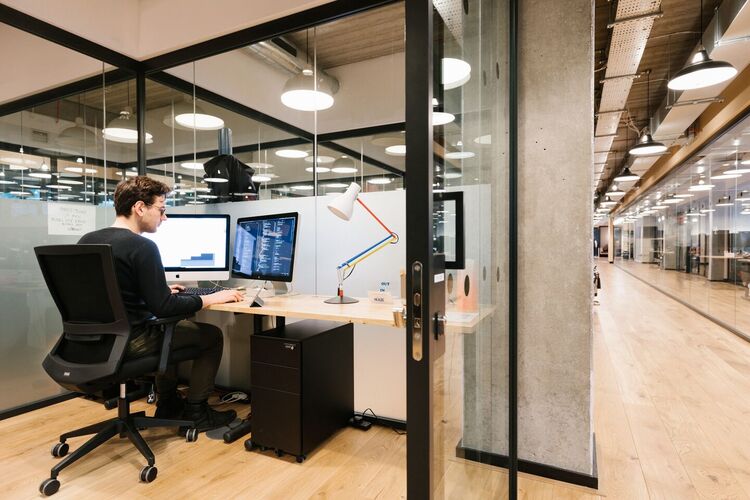Modern technology continues to shape the way we work. By 2025, many people have traded the daily commute for a home office, a local café, or a coworking space nearby, as hybrid and remote work styles have become the norm rather than the exception. Still, we can’t underestimate the value of a physical office; videoconferencing can’t fully replace real-time collaboration, whether it’s brainstorming on a whiteboard or catching up over coffee.
More and more companies are embracing flexible models that let employees move easily between home and office. But for early-stage startups, the decision isn’t always straightforward. Limited budgets, small teams, and remote-friendly workflows often make a traditional lease feel out of reach. In 2025, the question isn’t whether to have an office—it’s how your workspace supports growth, remote collaboration, and team cohesion, all without overspending.
Startups, in particular, need the freedom to adapt as their needs evolve.

So, where should you start or grow your business?
Go conventional with a standard office space
Renting a traditional office isn’t always a go-to for startups, but in some cases, it can be the right fit. If your team handles sensitive information or simply needs a quiet, focused environment, having a dedicated space may offer peace of mind and structure.
That said, long-term leases and upfront costs can be tough for early-stage teams. In this day and age, flexibility is key—so if you’re considering this route, look for short-term or managed office options that reduce overhead and let you adapt as you grow.
A good match for startups in finance, legal, or enterprise tech that prioritize security, privacy, and a consistent in-person workspace.
Pros
- Meeting up with clients or new hires becomes easier in a space that is distinctly yours.
- It helps build a strong brand identity—you can furnish and design the space in a way that best aligns with your brand.
- It allows for more interactions within your team, which can boost both creativity and productivity.
Cons
- The expenses may become overwhelming as you grow.
- It’s harder to scale up or down as your needs change.
- Day-to-day responsibility for managing the space falls on you.
Considerations
- Get a clear picture of the full cost—including utilities, maintenance, and internet—before committing.
Go fully remote or work from home
For early-stage startups, going fully remote is often the most budget-friendly and flexible option. With no rent or utility bills, you can invest more in product development and hiring. And in 2025, remote collaboration tools like async video updates, smart task trackers, and real-time messaging platforms make it simpler to stay aligned across time zones.
Of course, remote work has its tradeoffs. Without regular face-to-face time, it can be harder to build a strong team culture, maintain focus, or onboard new hires effectively—especially as your team expands. But for the right kind of team, these challenges can be managed with clear communication and the occasional in-person gatherings.
A good match for small, distributed teams that value flexibility, low overhead, and async collaboration—like SaaS, dev, or content startups.
Pros
- A great way to save both time and money—no commutes and no overhead costs.
- Freedom to hire talent from anywhere.
- Fully personalized, comfortable work environments.
Cons
- Social interactions are reduced to the online realm (no colleagues, only virtual ones).
- Distractions can occur, especially if you have roommates.
- It becomes harder to separate work and life.
Considerations
- Make sure your team stays connected by communicating clearly, onboarding thoughtfully, and meeting up in person when you can.
Work with other entrepreneurs in a coworking space
If working from home doesn’t meet all your needs but a conventional office feels like too much commitment, coworking spaces offer a flexible middle ground. They’re a popular option for today’s startups, providing everything from hot desks for occasional use to private offices for growing teams. WeWork locations, for example, offer a range of setups—whether you need a workspace a few days a week or a dedicated office with room to expand—along with monthly or annual memberships.
Coworking spaces also give you a chance to connect with other entrepreneurs and small teams in a shared, well-equipped environment. Amenities like phone booths, meeting rooms, printing, and stocked kitchens are standard, and the spaces are designed to support both focus and collaboration. Plus, WeWork makes it easy to adjust your setup as your needs evolve—a big plus for startups still figuring out how and where they work best.
A good match for hybrid teams, creative agencies, or founders who want an energizing environment without long-term commitment.

Pros
- You’ll work alongside like-minded entrepreneurs and small teams.
- Affordable but still gives you a polished, professional workspace.
- Usually located in vibrant, central areas.
- Flexible memberships with no long-term commitments.
Cons
- Distractions can be common in open or high-traffic areas.
- You’ll need to pay extra for private offices or frequent meeting room use.
Considerations
- Take advantage of coworking day passes to see if these collaborative environments are what your business needs.
Work from anywhere you like with a virtual office
Virtual offices are a smart solution for startups that don’t need a full-time physical workspace but still want to maintain a professional presence. They let you register your business at a recognizable address, receive mail and packages, and access meeting rooms when needed—all while your team works remotely.
With WeWork Business Address, you can set up your company in a central location without the overhead of a long-term lease. It’s a flexible way to establish credibility, especially for client-facing businesses or teams that occasionally need a professional space to meet.
While virtual offices aren’t designed for everyday collaboration, they can support your operations, enhance your image, and simplify logistics as you scale.
A good match for solo founders, consulting businesses, or remote-first teams that want a professional address without renting office space.
Pros
- Professional address and mail handling without high overhead.
- Access to meeting rooms when needed.
- Affordable and low-commitment.
Cons
- No dedicated space for day-to-day team interaction.
- Limited functionality beyond mail handling and occasional meeting room access.
Considerations
- Think about how often you’ll need to meet with clients and coworkers in person, then find a virtual office that also offers access to meeting rooms.
What’s right for your startup?
Before committing to any type of workspace—whether physical, virtual, or hybrid—make sure it aligns with your team’s needs, your stage of growth, and how you work.
Ask yourself:
- Does it fit our budget now and as we grow?
- Can it scale with us if our team expands or shifts?
- Does it support the way we collaborate—remotely, in person, or both?
- Will it help us present a professional image to clients, partners, or investors?
- Is it in a location that’s practical for our current and future team?
There’s no one-size-fits-all answer. The right space is the one that helps your team stay focused, flexible, and ready to grow. Take the time to explore your options—you’ll be glad you did.




